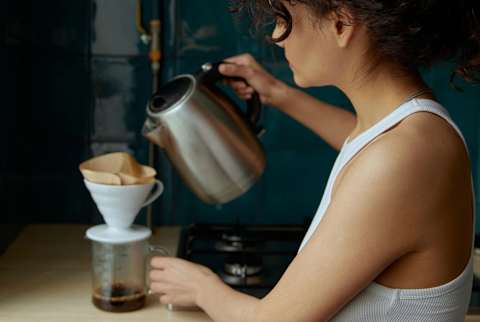Advertisement
Want To Lower Your Cancer Risk? Unsweetened Coffee & Tea Can Help


What we eat matters a lot when it comes to cancer risk. Research consistently shows that diets rich in vegetables, fruit, protein, and whole grains1 protect against many types of cancer, while higher intakes of sugar and processed foods2 increase risk. But what we drink matters too.
A large new study published in The Journal of Nutrition looked at how different beverages impact cancer risk and outcomes. Researchers found that regularly drinking unsweetened coffee and tea offered the strongest protective effect.
So what does this mean for your daily coffee, tea, or other favorite drinks? Let’s take a closer look.
About the study
Researchers analyzed dietary and health data from 189,000 participants from the UK Biobank (one of the world’s largest ongoing health studies). All participants were between the ages of 37 and 73 years old and provided information about what they drank.
Drinks were classified into broad categories like coffee, tea, sugar-sweetened beverages, artificially sweetened beverages, fruit juices, milk, and milk-based drinks. Every 8.5-ounce serving consumed counts as one drink.
To see how beverages might relate to cancer risk, researchers followed these people for an average of 9 years and kept track of who developed cancer and who died from it.
Unsweetened coffee and tea were the most protective
Results show that people who drank more than 2 cups of unsweetened coffee a day had a 5% lower risk of getting cancer and an 11% lower risk of dying from it than people who didn’t drink unsweetened coffee.
Similar results were seen for those who drank 2 cups of unsweetened tea (including green and black tea): They had a 6% lower chance of getting cancer and a 16% lower chance of dying from it.
People were classified as unsweetened coffee or tea drinkers if they reported never adding sugar or artificial sweeteners, so those who occasionally sweeten their drinks might see different effects.
RELATED READ: This Is The Best Time Of The Day To Drink Coffee
Why is this the case?
Both coffee and tea are beverages that are packed with an array of beneficial phytonutrients.
Coffee is a rich source of chlorogenic acid, ferulic acid, coumaric acid3, and caffeic acid4. And tea provides catechins, flavonoids, and L-theanine.
These compounds can help lower inflammation and oxidative stress in the body, both of which are factors that influence how cancer develops.
But these effects can be negated when lots of sugar is added to the drink. Sugar from beverages is often more rapidly absorbed into the bloodstream and can trigger an inflammatory response. In fact, a recent meta-analysis found that drinking sugar (rather than eating it) poses a bigger risk for long-term health.
How to make unsweetened coffee & tea taste good
For coffee lovers, there are a few ways to make a cup of plain coffee taste delectable and make it even more anti-inflammatory.
- Start with high-quality beans. Why? Well, the volume and diversity of polyphenols will vary in different coffee products (thanks to bean variety, roasting techniques, and storage methods). Choose 100% organic arabica beans, as this coffee variety has fewer bitter compounds and more brightness than robust blends. This is our favorite coffee blend.
- Add a dash of cinnamon. Cinnamon adds warmth as well as a slight sweetness, with no actual sugar.
- Mix in a collagen powder: Collagen powders are great for supporting skin and hair health. And mixing it into your morning coffee is a great way to take it daily, as it adds a natural creaminess to the brew. Just avoid the collagen powders with added or artificial sugars. Wondering which one is best? These are our expert-approved recommendations for collagen supplements.
As for tea:
- Add a squeeze of citrus: A bit of fresh lemon, lime, or orange can instantly brighten up tea.
- Use fresh herbs and berries: Try steeping tea with herbs (like mint, basil, or rosemary) or fruit (like berries or peaches) to infuse more flavor into the drink, sans any sugar. You can do this when the tea is hot or if you cold brew tea overnight.
What about other beverages?
Results of this study also showed that sugary drinks (like sodas and even flavored milks and yogurt drinks) are linked to higher cancer risk, particularly for lung cancers.
However, drinking some 100% fruit juice (which only contains natural sugars) also showed some protective effects. Pure fruit juice provides some vitamin C and other plant antioxidants, but it lacks fiber.
However, the study authors emphasize that too much fruit juice still provides a concentrated amount of sugar, and eating fruit would still be more beneficial.
The takeaway
Coffee and tea are continually linked to better health outcomes, including cancer.
It’s easy to overload these beverages with sugar (which hinders these benefits). But by making a few tweaks to your preparation methods, you can spruce up your cup enough to enjoy it unsweetened.
